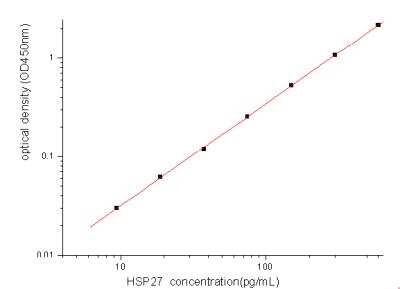HSP27 Antibody Pair [HRP]
Novus Biologicals, part of Bio-Techne | Catalog # NBP2-79579

Key Product Details
Assay Type
Sandwich ELISA
Assay Range
9.38-600 pg/ml (example only; lot dependent)
Sensitivity
9.4 pg/ml (example only; lot dependent)
Reactivity
Human
Product Specifications
Description
Solid Phase sandwich ELISA for the quantitative determination of Human HSP27.
Sample Volume Required
100 ul
Conjugate
HRP
Scientific Data Images for HSP27 Antibody Pair [HRP]
Sandwich ELISA: HSP27 Antibody Pair [HRP] [NBP2-79579] - This standard curve is only for demonstration purposes. A standard curve should be generated for each assay.
Kit Contents for HSP27 Antibody Pair [HRP]
- Mouse Monoclonal Detection Antibody (HRP-conjugated)
- Rabbit Monoclonal Capture Antibody: (Catalog # NBP2-89442)
- Standard
Preparation and Storage
Shipping
The product is shipped with polar packs. Upon receipt, store it immediately at the temperature recommended below.
Stability & Storage
Storage of components varies. See protocol for specific instructions.
Background: HSP27
Long Name
Heat Shock Protein 27
Alternate Names
HSP25, HSPB1
Gene Symbol
HSPB1
Additional HSP27 Products
Product Documents for HSP27 Antibody Pair [HRP]
Product Specific Notices for HSP27 Antibody Pair [HRP]
This product is for research use only and is not approved for use in humans or in clinical diagnosis. Antibody Pairs are guaranteed for 6 months from date of receipt.
